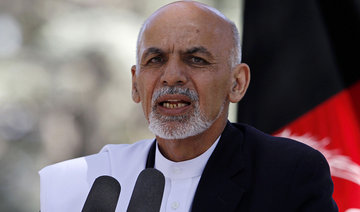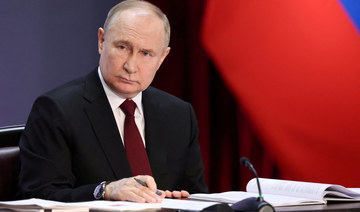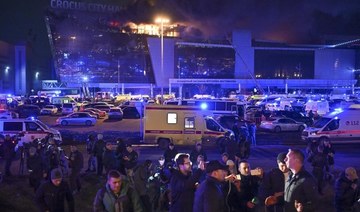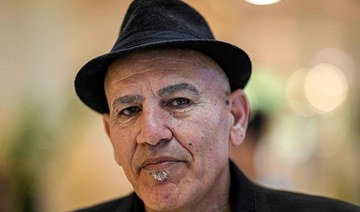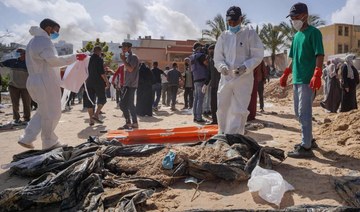ISLAMABAD/KABUL: Pakistan’s tribesmen, who have been protesting since Feb. 1 to seek justice for Naqeebullah Mehsud, have formally announced they will call off their sit-in after the government assured them in writing it will fulfil their demands within a month.
Prime Minister Shahid Khaqan Abbasi has accepted two out of five demands put forth by the tribesmen including the arrest and bringing the accused Rao Anwar to justice as soon as possible, and clearance of land mines from the Federally Administered Tribal Areas (FATA).
The PM has, however, apparently not acknowledged three demands that included an end of what they have described as extrajudicial killings of tribal people in Karachi and other parts of the country; recovery of all missing tribal people and presenting them in court; and ending curfews in tribal areas after any untoward incident.
“Genuine grievances raised by jirga members from different quarters would also be addressed as soon as possible,” the prime minister assured the tribesmen in the written promise.
Rao Anwar, who is accused in the killing of 27-year-old aspiring model Mehsud in a staged encounter in Karachi last month, is still at large despite a suo moto notice by the Supreme Court.
“We are ending our sit-in, but we have given a one-month deadline to the authorities and if, during this period our demands are not met, we will come again,” protest organizer Noor Rehman told Arab News.
Addressing protesters outside the National Press Club this evening, the prime minister’s adviser on political affairs, Amir Muqam, said that India and other countries have been propagandizing against Pakistan due to the sit-in; therefore, it immediately should be called off.
The chief spokesman of Afghan President Ashraf Ghani on Saturday said that he hopes the protest by group of tribesmen in Islamabad will turn into a “civil move” against extremism which has become an obstacle against development because the region has fallen victim to terrorism.
“The world, media, and civil society need to back this historical move,” Shah Hussein Murtazawi told Arab News.
Afghan President Ashraf Ghani on Friday voiced his support in favor of the protest in Pakistan by ethnic Pashtuns.
A social media savvy group of young Pashtuns organized a sit-in in Islamabad, creating the hashtag #PashtunLongMarch.
“I fully support the historical #PashtunLongMarch in Pakistan. The main purpose of which is to mobilize citizens against fundamentalism and terrorism in the region,” Ghani said in a tweet.
“I hope #PashtunLongMarch will also succeed in uprooting and eradicating terrorism from their region. The historical importance of this march traces back to the great proponent of non-violence, Bacha Khan, whose philosophy was based on a non-violent ideology,” he added.
Khan was a national hero of the Pashtuns and pushed for the reunion of millions of people of the ethnic group, separated by British colonialists from ancient Afghanistan under a deal with a former Afghan ruler.
Ghani urged the media to help the protesters present their demands, calling the march as “a wake-up call against fundamentalism.”
Pakistani tribesmen, who were holding the long march to seek justice for Naqeebullah Mehsud, found Ghani’s statement uncalled for.
“We are patriotic Pakistanis and cannot allow anyone to interfere in our internal issues,” Mehmood Khan Mehsud, a tribal elder who is supporting the protest, told Arab News.
“The Afghan president should try to put his own house in order by cracking down against militants instead of poking his nose in Pakistan’s internal affairs,” he suggested.
He said their protest was apolitical and they were just struggling to get justice for Mehsud.
“Ashraf Ghani has tried to incite the tribal people against our government and we condemn it with one voice,” said another tribal leader Samiullah Burki.
“We have rendered invaluable sacrifices in the war against terrorism and continue to do so to make Pakistan a peaceful and prosperous country,” he said.
Pakistani tribesmen call off sit-in, reject Ghani’s support of their protest
Pakistani tribesmen call off sit-in, reject Ghani’s support of their protest
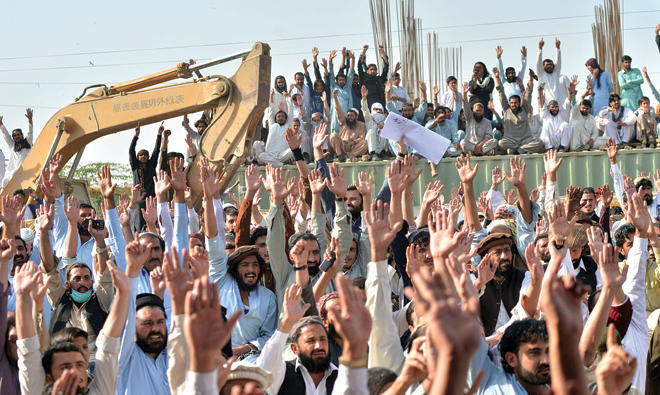
Ukraine suspends consular services abroad for men of fighting age

- Ukraine’s foreign affairs ministry “announced a temporary suspension of accepting new applications for consular services” for men between 18 and 60
- It made an exception for documents allowing Ukrainians to return to Ukraine
KYIV: Ukraine authorities on Tuesday suspended consular services for men of fighting age living abroad, after announcing measures to bring them home amid manpower shortages in the army fighting Russia.
Ukraine’s army has been struggling to hold frontlines, partly due to a lack of soldiers over two years into Russia’s invasion.
Ukraine’s foreign affairs ministry “announced a temporary suspension of accepting new applications for consular services” for men between 18 and 60.
It made an exception for documents allowing Ukrainians to return to Ukraine.
The move would likely oblige Ukrainian men to return from abroad to undergo administrative procedures that were previously available abroad.
The government has already adopted a mobilization law, due to come into force on May 18, that toughens penalties against draft dodgers and obliges men to keep their military registration up-to-date.
The ministry said men would be able to access consular services once the law came into force and “after updating their military registration.”
“Male citizen of Ukraine aged 18 to 60 with valid military registration documents will have full access to consular services,” the ministry said.
Ukrainian men have been forbidden to leave the country since the invasion began, apart from a few exceptions.
But some lived away before the war began, and Ukrainian media estimates that thousands more illegally fled the country.
Major arrests at NYU campus as Gaza protests spread
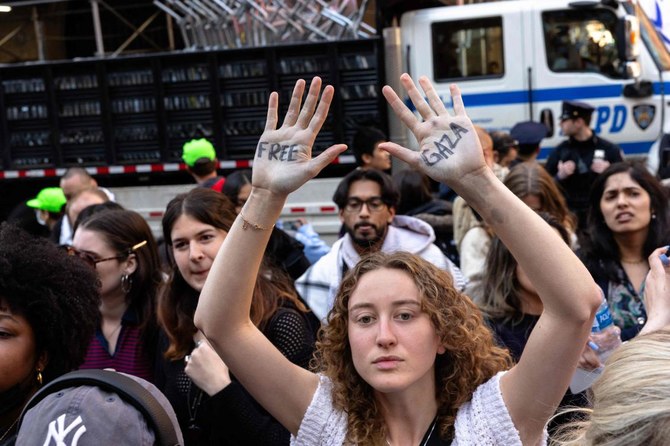
- Some of America’s most prestigious universities have been rocked by protests in recent weeks
- On Tuesday, the New York Police Department said 133 people had been arrested at NYU and released after being issued with court summons
NEW YORK: More than 130 people were arrested overnight during pro-Palestinian protests at the New York University campus, as student demonstrations gather pace in the United States over the Israel-Hamas war.
Some of America’s most prestigious universities have been rocked by protests in recent weeks as students and other agitators take over quads and disrupt campus activities.
The demonstrations come amid sweeping debates over Israel’s assault on Gaza, following Hamas’s deadly invasion on October 7.
Such bastions of higher education — Harvard, Yale, Columbia and others — are grappling for a balance between students demanding free speech rights and others who argue that campuses are encouraging intimidation and hate speech.
On Tuesday, the New York Police Department told AFP that 133 people had been arrested at NYU and released after being issued with court summons, as protests also intensify at Yale, Columbia University and other campuses.
As the holiday of Passover began Monday night, police began detaining demonstrators at an encampment at NYU who had earlier refused orders to disperse.
A New York University spokesman said the decision to call police came after additional protesters, many of whom were not thought to be affiliated with NYU, suddenly breached the barriers erected around the encampment.
This “dramatically changed” the situation, the spokesman said in a statement on the school’s website Monday, citing “disorderly, disruptive and antagonizing behavior” along with “intimidated chants and several antisemitic incidents.”
“Given the foregoing and the safety issues raised by the breach, we asked for assistance from the NYPD. The police urged those on the plaza to leave peacefully, but ultimately made a number of arrests.”
The spokesman said the school continues to support freedom of expression and the safety of students.
But protests have grown large and disruptive enough — New York Police Department spokesmen have spoken of their officers facing violence when confronting protesters at NYU — to draw the attention of President Joe Biden and his administration.
“Anti-Semitic hate on college campuses is unacceptable,” US Secretary of Education Miguel Cardona posted on X on Tuesday, expressing concern about the unrest.
The protests began last week at Columbia University, also in New York, with a large group of demonstrators establishing a so-called “Gaza Solidarity Encampment” on school grounds.
But more than 100 protesters were arrested after university authorities called the police onto Columbia’s campus Thursday, a move that seemingly escalated tensions and sparked a greater turnout over the weekend.
Social media images late Monday appeared to show pro-Palestinian Jewish students holding traditional seder meals inside the protest areas on campuses including at Columbia.
There were also demonstrations at MIT, the University of Michigan, UC Berkeley and Yale, where at least 47 people were arrested Monday after refusing requests to disperse.
France arrests eight in PKK financing probe
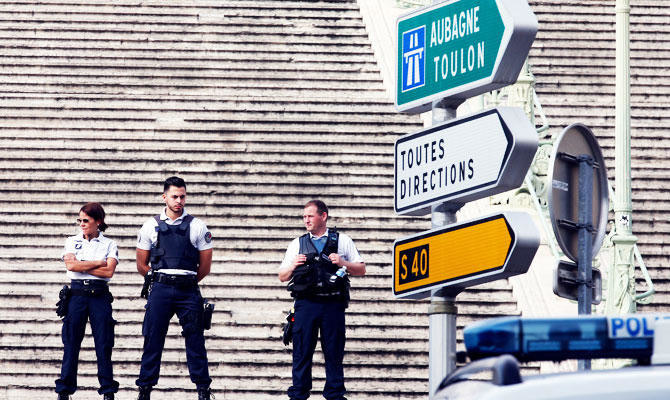
- The arrests took place in the Paris region and in southern France, the PNAT anti-terror unit said
- French prosecutors suspect the eight of preparing and financing terrorist acts
PARIS: French police arrested eight men on Tuesday as part of an investigation into the finances of the Kurdistan Workers Party (PKK), banned as a terror organization by Turkiye and its Western allies, anti-terrorism prosecutors told AFP.
The arrests took place in the Paris region and in southern France, the PNAT anti-terror unit said.
The PKK has been designated a terrorist organization by Turkiye, the United States and the European Union.
French prosecutors suspect the eight of preparing and financing terrorist acts, and of conspiring to extort, or attempt to extort, funds to finance a terrorist organistion between 2020 and 2024, the PNAT said.
Investigators believe the eight to be connected to a campaign to collect funds from Kurdish business people and other Kurds in France, a source close to the case added.
Police can hold the suspects for up to 96 hours for questioning, the source said.
Another source said the funds were destined for use in Belgium, where police on Monday raided Kurdish-run media as part of a probe undertaken at the request of a French anti-terror judge, the PNAT said.
The PKK has waged a decades-long insurgency for greater autonomy for the Kurdish minority of Turkiye in the southeast of the country, in a standoff with the Ankara government that remains unresolved to this day.
Dutch intelligence sees the wars in Gaza and Ukraine as triggers for terrorist threats
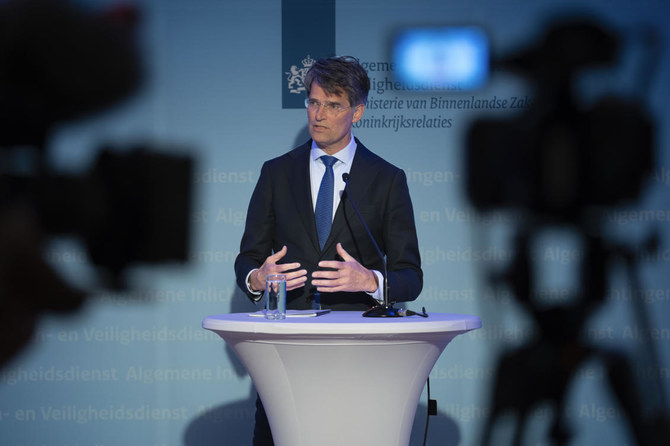
- The Israel-Hamas war in Gaza and the destruction of a Qur’an outside parliament last year are “trigger events” for extremists
- “The terrorist threat is serious at this moment,” the agency’s director-general, Erik Akerboom, told AP
ZOETERMEER, Netherlands: The Dutch national intelligence agency said Tuesday that threats targeting the Netherlands are increasingly connected to worldwide turmoil, including the wars in Gaza and Ukraine.
Although the number of terror attacks across Europe has been down in recent years, the General Intelligence and Security Service in its annual report said the Israel-Hamas war in Gaza and the destruction of a Qur’an outside parliament last year are “trigger events” for extremists.
“The terrorist threat is serious at this moment,” the agency’s director-general, Erik Akerboom, told The Associated Press.
Akerboom said he is particularly concerned about big events, noting that the agency is working closely with French authorities to prevent incidents during the Paris Olympics this summer.
In December, the Dutch counterterrorism agency increased the country’s threat alert to its second-highest level because of concerns about the Daesh group’s Khorasan affiliates, Akerboom said. IS-K, a Central Asian affiliate, was responsible for the attack at a suburban Moscow concert hall that killed at least 133 people in March.
According to the new report, “global jihadism has been the greatest terrorist threat for years in the Netherlands.” Incidents such as the one last April, when an anti-Islam activist tore pages from the Qur’an in front of the Dutch parliament building, put the Netherlands on the map of targets.
About a dozen terror attacks were thwarted by authorities in Europe last year and in four cases, suspects were arrested in the Netherlands, the report said. None of those attacks was focused on the Netherlands, according to Akerboom.
The Dutch also see threats from China, in particular cyberattacks, as a major concern. Akerboom said China is producing more hackers to break into Dutch systems than the Dutch can produce to defend them. The security service has cited China as the biggest threat to the country’s economic security.
Russia also continues to pose a risk to the Netherlands amid Moscow’s full-scale invasion of Ukraine. So-called peace protests in Amsterdam which call for the Dutch to stop sending arms to Ukraine have included demonstrators paid by Russian sources to attend and given prefabricated slogans, the security service has asserted.
The Netherlands is of particular interest to Moscow in part because of the international institutions housed here, including the International Criminal Court. The Hague-based court is investigating crimes in Ukraine and has issued arrest warrants for President Vladimir Putin and other Russians.
Sunak says UK to raise defense spending amid global threats
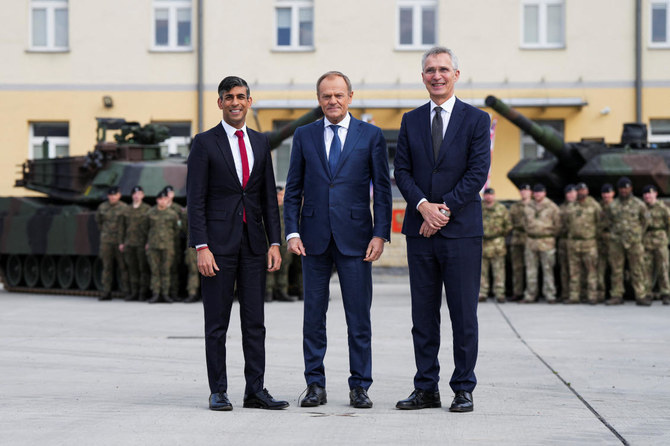
- “In a world that is the most dangerous it has been since the end of the Cold War, we cannot be complacent,” Sunak told reporters
- The increase in spending from 2.3 percent will see the UK become one of the highest spenders on defense in the 32-member defense alliance
WARSAW: Britain will raise defense spending to 2.5 percent of GDP by 2030 in a “most dangerous” world, Prime Minister Rishi Sunak said Tuesday during a visit to Poland.
The commitment came as NATO countries face pressure to raise defense spending in the face of global threats, particularly from Russia.
“In a world that is the most dangerous it has been since the end of the Cold War, we cannot be complacent,” Sunak told reporters in Warsaw, where he held a press conference with NATO Secretary-General Jens Stoltenberg.
The increase in spending from 2.3 percent will see the UK become one of the highest spenders on defense in the 32-member defense alliance after the United States, the British government said.
It means the UK is expected to spend £87 billion on defense in 2030-31, an increase of £23 billion over current levels.
“I believe we must do more to defend our country, our interests, and our values,” Sunak said, announcing “the biggest strengthening of national defense for a generation.”
Western nations are under pressure to boost defense funding following Moscow’s invasion of its neighbor Ukraine as well as the threat of escalation in the Middle East.
EU chief Ursula von der Leyen recently called for a “European awakening on defense and security.”
Brussels is set to come up with more proposals for financing the defense push by a summit of EU leaders in June.
Sunak has also faced calls from his Conservative Party to boost defense spending, with some calling for a level of three percent of GDP.
On Tuesday, Sunak also announced £500 million additional funding for Ukraine’s war effort against Russia.



